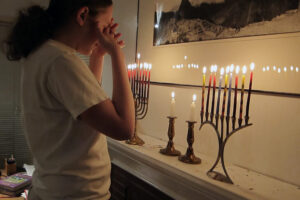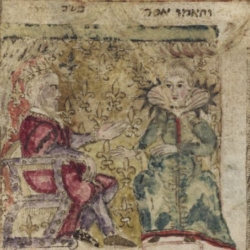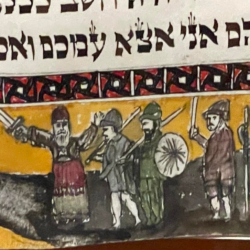| Source (Hebrew) | Translation (English) |
|---|---|
מִי כָמֽוֹךָ? שַׁבָּת וַחֲנֻכָּה נִגְּשׁוּ וַיְרִיבוּן לְפָנָי, זֶה יֹאמַר לַיְיָ אָנִי וְזֶה יִקְרָא בְאׇזְנַי; מָה אֶעֱשֶׂה לָאֵֽלֶּה הַיּוֹם נֶֽגֶד נְבוֹנָי? עָשִׁיר וָרָשׁ נִפְגָּֽשׁוּ עֹשֶׂה כֻּלָּם יְיָ. |
Is anyone like you? Shabbat and Ḥanukkah met and fought before me. This one said, “I am YHVH’s,” and this cried into my ear. What shall I do for these today across from my cogniscenti? The wealthy and the poor have met; YHVH makes them all. |
אָמַר שַׁבָּת לַחֲנֻכָּה: לִי מִשְׁפַּט הַבְּכוֹרָה וּמִי אַתְּ וּמִי מִשְׁפַּחְתְּךָ הַצְּעִירָה, כִּי בִי שָׁבַת אֵל גָּדוֹל וְנוֹרָא מִכׇּל־מְלַאכְתּוֹ אֲשֶׁר בָּרָא. |
Shabbat said to Ḥanukkah: Mine is the legal status of the firstborn, So who are you, and who is your nascent family? For, within me, the great and awesome God ceased From all of God’s craft that God created. |
אָמְרָה חֲנֻכָּה לַשַּׁבָּת: מַה תִּתְנַפֵּל עָלַי וְתִתְגּוֹלֵל? כִּי שְׁמוֹנָה יָמִים גּוֹמְרִים בִּי הַהַלֵּל וְאַתְּ יוֹם אֶחָד בְּלֹא זֶה וּמַה־תְּמַלֵּל? שׁוֹמֵר מַה־מִּלַּֽיְלָה שׁוֹמֵר מַה־מִּלֵּיל. |
Ḥanukkah said to Shabbat: Why would you fall on me and roll again? Indeed, for eight days we recite Hallel on me, But you are one day without it, and is there anything you utter? “Guardian, what is of night? Guardian, what is of nighttime?” |
אָמַר שַׁבָּת לַחֲנֻכָּה: מוּסָפִי יוֹרֶה עָלַי דִּין עֲלִיָּה, עוֹלַת שַׁבָּת בְּשַׁבָּתוֹ עַל עוֹלַת הַתָּמִיד עֲשׂוּיָה, וּמַה תִּתְהַלֵּל עָלַי בְּעַד הַלְלוּיָהּ וְאַתְּ מִמּוּסָף עֵרוֹם וְעֶרְיָה? |
Shabbat said to Ḥanukkah: My Musaf adjudicates for me an elevated status. The whole-burnt offering of Shabbat on each Shabbat supplements the whole-burnt offering of the daily offering. And should you be praised above me because of a “Halleluyah”— When you are flagrantly denuded of Musaf!? |
אָמְרָה חֲנֻכָּה לַשַּׁבָּת: זִיו נֵרוֹתַי מַדְלִיקִים תְּחִלָּה וְנֵרוֹתֶֽיךָ אַחֲרֵיהֶם וְזִכְרִי בְּבִרְכַּת הָאָֽרֶץ וְזִכְרְךָ בְּבִרְכַּת רַחֵם, וְכׇל־עִנְיָנֶֽיךָ וּדְבָרֶֽיךָ הֲלֹא הֵם אַחֲרֽוֹנָה יִסְעוּ לְדִגְלֵיהֶם. |
Ḥanukkah said to Shabbat: They light the glow of my candles first and your candles after them, And my mention is in the blessing of the earth, and your mention is in the blessing of “Have mercy.” And aren’t all of your ideas and your words Last to trail their emblems? |
אָמַר שַׁבָּת לַחֲנֻכָּה: הִנֵּה אֲנִי תָדִיר כְּאֵֽשֶׁת נְעוּרִים תְּמִימָה, קְרוּעָה לְשִׁבְעָה יָמִים כִּכְבוּדָה בַּת מֶֽלֶךְ פְּנִֽימָה, וְאַתְּ כְּפִלֶגֶשׁ בַּלֵּילוֹת בְּאֵימָה לְמוֹעֲדָהּ מִיָּמִים יָמִֽימָה. |
Shabbat said to Ḥanukkah: Behold, I am consistent, like a young innocent woman, Torn [in mourning] for seven days like the inner honor of the daughter of a king, And you are like a concubine during nights during fright On some occasion between days-upon-days. |
אָמְרָה חֲנֻכָּה לַשַּׁבָּת: בְּנֵרְךָ מִסְתַּכְּלִים וּמִשְׁתַּמְּשִׁים וַאֲנִי כִּגְבֶֽרֶת עַל אֲנָשִׁים וְנָשִׁים, וְשִׁירְךָ לְשָׁרִים וּלְשִׁירַי יוֹרְשִׁים יְהִי הַמִּקְדָּשׁ קֹֽדֶשׁ קֳדָשִׁים. |
Ḥanukkah said to Shabbat: They look your candle and objectify, And I am like a lady above men and women. And your song is for singers, but my songs are for those who inherit The Temple that will be, with the Holy of Holies. |
אָמַר שַׁבָּת לַחֲנֻכָּה: אֲנִי הַגֶּֽבֶר הַמְשֻׁבַּח וְהַמְהֻלָּל וְאַתְּ כְּאִשָּׁה הֵעֵֽזָה פָנֶֽיהָ וְתִשְׁלוֹל שָׁלָל, וַהֲרֵי אָמְרוּ חַכְמֵי הַיֹּֽפִי וְהַמִּכְלָל: אֵין מִשְׁתַּמְּשִׁים בְּאִשָּׁה כְלָל. |
Shabbat said to Ḥanukkah: I am the praised and exalted man, And you are like a woman who has hardened her face and looted loot! But, indeed, the wise in aesthetic and principle said: We do not objectify a woman ever. |
אֲנִי עָנִֽיתִי: שֽׁוּבוּ לָכֶם מִן הַמְּרִיבָה כִּי הַיּוֹם חֻבַּרְתֶּם בְּחִיבָּה, שֽׁוּבוּ נָא אַל תְּהִי עַוְלָה וְשֽׁוּבוּ עוֹד צִדְקִי בָהּ, הִשְׁבַּֽעְתִּי אֶתְכֶם: אַל נָא תְהִי מְרִיבָה, מַה תָּעִֽירוּ וּמַה תְּעוֹרְרוּ אֶת־הָאַהֲבָה! |
I answered: Recuse yourselves from this fight, For today you are entwined in an embrace. Please go back. Do not become a defect, but return; my righteousness is still there. I have made an oath with you: Do not be a quarrel! What will you incite? And what will you arouse? Love! |
שַׁבָּת רִאשׁוֹן בְּמוֹעֲדִים יִכְלוּ טַעֲנוֹתֶֽיךָ, יׇפְיָפִֽיתָ מִבְּנֵי אָדָם הוּצַק חֵן בְּשִׂפְתוֹתֶֽיךָ, אַךְ גּוֹאֵל אַתָּה וְאֵין לִגְאוֹל זוּלָתֶֽךָ וּפָרַֽשְׂתָּ כְנָפֶֽיךָ עַל אֲמָתֶֽךָ. |
Shabbat, the premier of holy gatherings will exterminate your charges. You have grown more beautiful than humanity. Grace has been poured into your lips. And you are a redeemer; there is no redeeming without you. You have spread your wings over your maidservant. |
הַמְשֻׁבֶּֽצֶת זָהָב הַיּוֹשֶֽׁבֶת בִּגְבוּלוֹ הִנֵּה מַלְאָךְ יָבֹא לָךְ צַדִּיק וְנוֹשַׁע הוּא וְחֵילוֹ, וַיִּתְאַו הַמֶּֽלֶךְ יׇופְיֵךְ וְהַטִּי אׇזְנֵךְ לְקוֹלוֹ כִּי הוּא אֲדוֹנַֽיִךְ וְהִשְׁתַּחֲוִי לוֹ. |
The golden array sitting at that threshold— Behold, there is coming towards you a righteous angel; he and his strength have been saved. The king has desired your beauty, so incline your ear towards his voice, For he is your lord, and you shall prostrate before him. |
אֱלֹהַי מִמְּכוֹן שִׁבְתְּךָ הוֹפִֽיעָה וַהֲשִׁיבֵֽנוּ וְהָאֵר פָּנֶֽיךָ וְנִוָּשֵֽׁעָה כִּי אַתָּה תַּשְׁקִיט וּמִי יַרְשִֽׁיעַ וּמִבַּלְעָדֶֽיךָ אֵין לָֽנוּ גוֹאֵל עוֹזֵר וּמוֹשִֽׁיעַ. |
God, appear from the foundation of Your seat, And return us, and shine Your face, and we shall be saved! When You quiet, who will do evil? And, without You, we do not have a helping and saving redeemer. |
This piyyut by Rabbi Shlomoh ben Eliyahu Sharvit haZahav was transcribed by Rabbi Jonah Rank based on the text as appearing in Leon J. Weinberger, Rabbanite and Karaite Liturgical Poetry in South-Eastern Europe: Critical Edition with Introduction and Commentary (Tuscaloosa, Alabama: Hebrew Union College Press and University of Alabama Press, 1991), pp. 238-240; find the former for extended commentary.
Weinberg found this text in the printed Maḥzor Romanyah (Constantinople 1574); the manuscript Maḥzor Korfu (“Corfu”) (Oxford 1082); manuscript Maḥzor Korfu (London, JTS, Montefiore, 196/195). Note that in both Corfu manscripts the piyyut ends with “לְמוֹעֲדָהּ מִיָּמִים יְמִֽימָה” (“On some occasion between days-upon-days”).
Source(s)

Recordings
“Shabbat v’Ḥanukkah Nigeshu va’Yerivun (Mi Khamokha)” by Jonah Rank at Bandcamp ♪♫

“שַׁבָּת וַחֲנֻכָּה נִגְּשׁוּ וַיְרִיבוּן (מִי כָמוֹךָ) | Shabbat and Ḥanukkah Met and Fought, a piyyut by Shlomoh ben Eliyahu Sharvit HaZahav (ca. 15th c.)” is shared through the Open Siddur Project with a Creative Commons Attribution-ShareAlike 4.0 International copyleft license.










Leave a Reply